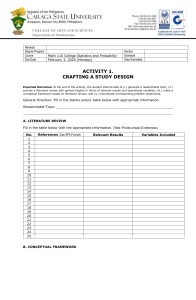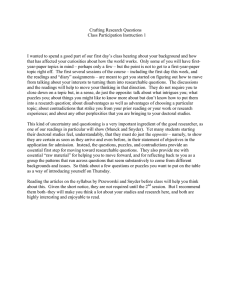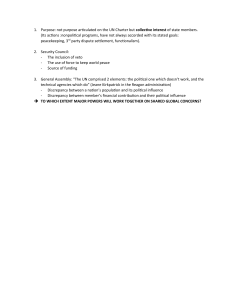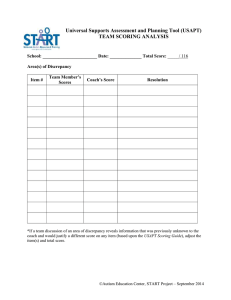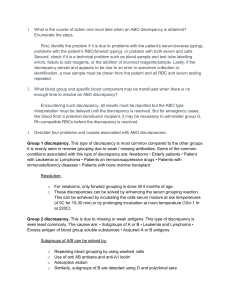Research Problem Identification: Topic Selection & Questions
advertisement
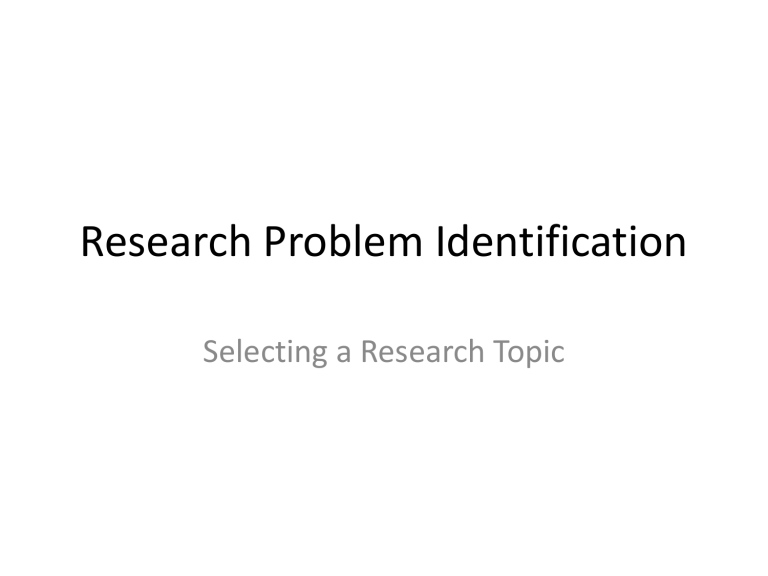
Research Problem Identification Selecting a Research Topic Title of proposed research • It tells the reader what the topic of study is. • Should be short but informative. • One must choose a broad area of interest or that is suitable for the situation. • Discuss or brainstorm with different people. • Gather literature and examine the possibility of getting data, the resources required and accessibility. • Identify two or more research topics Attributes of a good research topic • Interesting to study, • Is researchable given time, skills, funds and data. • Is linked to economic theory. • Has symmetric potential outcomes i.e results would be valuable whether positive or negative. • Forms the basis of well-defined research questions/ objectives. Definition of research problem/question/ problem statement • Is the discrepancy between the actual (or perceived) situation and the ideal (or desired) situation. • Or is the difference between what is known or understood about a problematic situation and what is needed (or desired) to be known to improve the problematic situation. • It is a gap in knowledge or a contradiction between principle and practice. Formulating a good research problem/question/ problem statement • Demonstrate with data or literature that the problem is critical, for example, that it affects a large proportion of the population or that previous work indicates that the problem is important. • One can discuss the potential consequences if the problem is not addressed. • Reference (but not review) to the literature can be made while discussing the research issue. A good research problem/question/problem statement • It should contain some questions as to why there is a discrepancy or contradiction between the principle and practice. • Should set the stage for what needs to be discovered to close the knowledge gap. • Should generally motivate the reader that there is really a problem that requires an urgent attention. • Problem statements often have three elements: • the problem itself, stated clearly and with enough contextual detail to establish why it is important; • the method of solving the problem, often stated as a claim or a working thesis; • the purpose, statement of objective and scope of the document the writer is preparing. Research questions to be answered • We discovered earlier on that a good problem statement should contain some key questions regarding the discrepancy between the principle and practice. • This means that after the research problem, one needs to develop research questions to focus your study Importance of research questions Guide your literature search; Guide your decisions about the kind of research design to employ; Guide your decisions about the source and type of data to collect; Data analysis techniques; Help to remain focused in the right direction of your study Sources of research questions • Marx (1997) suggests the following as possible sources of research questions: Intellectual puzzles and contradictions; Existing literature (theoretical and empirical); Replication; Structure and functions; A social, economic, political, cultural or technological problem; When common sense opposes scientific truths Sources of research questions Empirical examples that trigger amazement; New methods and theories; New social and technical developments and trends; Personal experience; Sponsors and tutors Attributes of good research questions Research questions should be: Clear/ understandable to you and others; Be researchable; Connect with established theory and research; Be linked to each other; Have potential for making a contribution to knowledge; Be neither too broad nor too narrow Framework for crafting research • WHAT? What puzzles/intrigues me? What do I want to know more about/ understand better? What are my key research questions? • WHY? Will this be of enough interest to others to be published as a thesis, book, paper, policy issue etc? Framework for crafting research Can the research be justified as a contribution to knowledge? • HOW? What models, concepts and theories can I draw on/ develop to answer my research questions? How can these be brought together into a basic conceptual framework to guide my in my investigation? What investigative styles and techniques shall I use to apply my conceptual framework (both to gather material and analyse it)? How shall I gain and maintain access to information sources.
